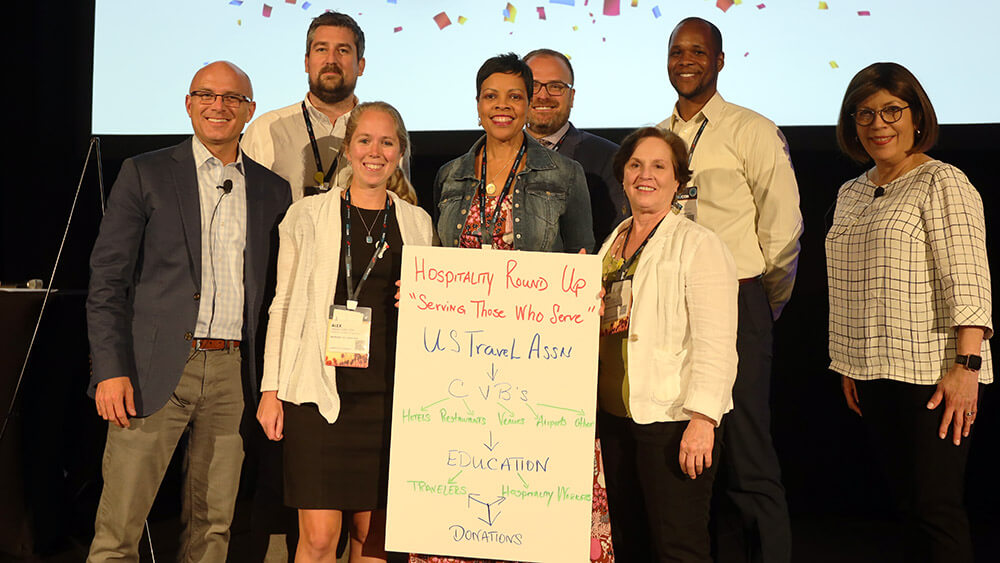
Winning team, left to right Alex Zapple, Carol Motley, and Bea Lewis; flanked by, left to right, Jamie Murdock, William Thomson, Stuart Ruff-Lyon, Keith Talbert, and Donna Kastner. (Jacob Slaton Photography)
On any given night, approximately half a million people in the United States are unsheltered or homeless. It’s an issue that intersects with the meetings industry — a majority of meeting professionals who responded to a Convene survey last year said that attendees had told them that they were not comfortable in a destination because of visible homelessness. It’s also a problem about which meeting professionals care deeply — 35 percent of respondents said that they’ve organized CSR efforts for homeless communities in destinations where they have held meetings.
That sense of empathy, along with a spirit of collaboration and innovation, fueled a six-hour pre-conference hackathon held Tuesday at the Education Conference, as well as the session, “Pitch-a-thon: Hackathon Teams Pitch Their Solution to Help the Unsheltered Homeless,” on Wednesday afternoon, where the five teams presented their solutions to the challenge: What might the meetings industry do to help those who are unsheltered?
The workshop was led by consultant Donna Kastner, an entrepreneur and expert on experience design, and Jamie Murdock, vice president of sales at Experient, who have facilitated successful hackathons at the Education Conference over the previous two years. It was the first time that the hackathon focused on a challenge that wasn’t tied to what planners are working on in their day-to-day lives. In addition, the challenge of homelessness is a complex one, which “got overwhelming very fast, once we started researching it,” Murdock said at the session.
Murdock and Kastner invited four experts to act as mentors for hackathon participants, including meeting professional William Thomson, the founder of Gallus Events in Barcelona, who organized a hackathon last year in Glasgow to help find solutions to homelessness; venture capitalist Michelle Crames, co-founder and CEO of tech company Pogo; Illah Schalles, the program director of Back on My Feet Greater Los Angeles, a nonprofit that uses running as a way to combat homelessness; and Josh Dean, co-founder of Human.nyc, a nonprofit that works to connect the street homeless in New York City to housing.
Participants were divided into five teams — each had three minutes to pitch their solutions and three minutes to answer questions from the audience. The winner was determined by an audience vote, combined with votes by Stuart Ruff-Lyon, PCMA Board chair-elect, and Keith Talbert, CMP, director of sales for the Oklahoma City Convention & Visitors Bureau, which sponsored the hackathon.
Pitches included a range of approaches and ideas, many of them focusing on the power of bringing meeting industry organizations together with destinations, meeting planners, and civic and nonprofit organizations to leverage their power and share information around best practices. One, for example, proposed a website named EMPACT — an acronym for Empathetic Meeting Professional ACT — that would connect those in need of help with resources. Another team proposed that hotels could dedicate one hotel room as housing for a year, which would be combined with job training and other resources to lift people out of homelessness.
The winning pitch was presented by a team consisting of Carol Motley, director of convention sales, Destination DC; Alex Zapple, CMP, CEM, associate director of meeting services, American Society of Nephrology; and Bea Lewis, CMP, director of events and convening, Catholic Charities USA, and was aimed at preventing homelessness in the hospitality community itself and came in the form of a two-part proposal.
The first step would be to raise awareness about housing insecurity within the hospitality industry, where the average salary is $16 an hour and the average workweek is 24 hours. The second step was to raise funds through a “Hospitality Round Up” campaign, that would ask hotel guests, restaurant patrons, and others using hospitality services to round up when paying their bills to the nearest dollar — or nearest hundred dollars. The funds would then be used to provide a variety of aid to hospitality workers — from job training and medical-care assistance to child care and direct emergency aid.
Bombas, the sock company that donates a pair of socks to the homeless for every pair sold, played a supporting role in the hackathon by donating socks and sponsoring Dean’s travel to the conference. The company also provided a “mic drop” moment — donating 5,000 pairs of socks, to be awarded to the nonprofit organization of the winning team’s choice.
It was technically a competition, but teams voiced their support for one another’s ideas and the hope that they could be combined going forward. “Today, as I listened to every single group’s presentation, I felt very proud,” said one participant.
“At Experient, we have a slogan — ‘First take good care of each other,’” Murdock said. “Yesterday we did that. Kudos. You are all winners.”
The real winner is Catholic Charities USA in Washington, D.C. The winning team chose the nonprofit as its charity, so PCMA will donate $1,000 to the charity on the team’s behalf, and in July, Bombas made its donation of 5,000 pairs of shoes to the organization.
Barbara Palmer is deputy editor of Convene. This story was updated with the donation information on August 3, 2019.
